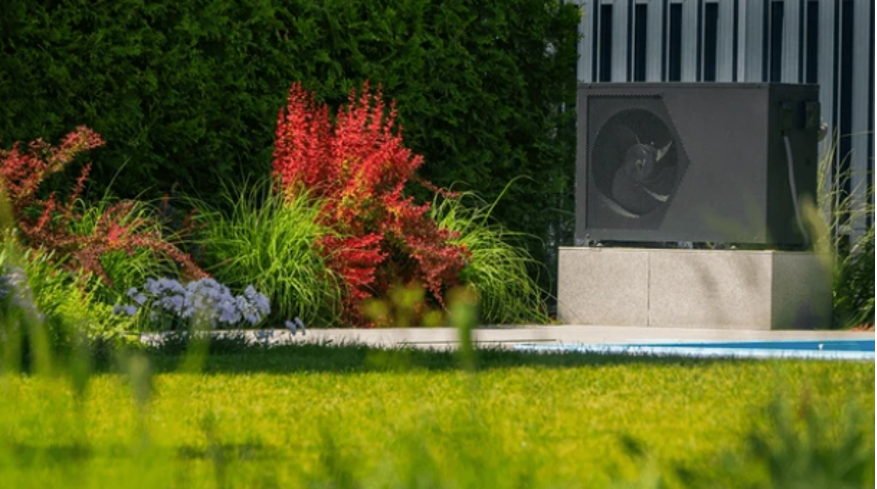Enjoying the pool does not have to be exclusive to the summer. With the installation of a heat pump, you can extend the swimming season and make the most of your pool throughout most of the year. In this article, we explain what a heat pump is, how it works, its maintenance and how to reduce operating costs by combining it with solar energy.
What is a swimming pool heat pump?
A heat pump is a device used to heat the pool water, allowing it to maintain a comfortable temperature even when outside temperatures begin to drop. This system harnesses heat from the outside air, amplifies it through a compression process and transfers it to the pool water. Unlike other heating methods, such as electric or gas heaters, heat pumps are more energy efficient, producing more thermal energy than they consume in electricity.
How does a heat pump work?
The operation of a heat pump is based on a refrigeration cycle similar to that of an air conditioner, but instead of cooling, it heats the pool water. The process takes place in several stages:
- Heat collectionThe heat pump absorbs heat from the outside air through an evaporator. A refrigerant circulates in this evaporator which, when it comes into contact with the air, heats up and evaporates.
- CompressionThe gaseous refrigerant is directed to a compressor that increases its temperature even more through compression.
- Heat transferThe hot coolant passes through a heat exchanger, where it transfers heat to the water circulating through the pump. This increases the temperature of the pool water.
- Return cycleOnce the refrigerant has transferred its heat to the water, it condenses and returns to its liquid state, restarting the cycle.
Maintenance of a heat pump
To ensure the proper functioning and longevity of your heat pump, it is important to perform regular maintenance. Here are some key tips:
- Evaporator cleaningEvaporator: The evaporator is the part of the heat pump that is exposed to the outside air. Over time, it can accumulate dirt, leaves and other debris. It is important to clean it periodically to maintain good efficiency.
- Coolant level checkRefrigerant is critical to the operation of the heat pump. If there are leaks or the level is low, the efficiency of the system will be affected. A specialized technician should check and recharge the refrigerant if necessary.
- Compressor overhaulThe compressor is the heart of the heat pump. It should be checked regularly for any signs of wear or malfunction. A well-maintained compressor ensures that the pump operates optimally.
- Filter and piping controlMake sure the water filters and pipes are clean and free of obstructions. This improves water flow and prevents the system from overworking.
- Annual professional maintenanceAlthough you can perform some maintenance tasks yourself, it is advisable to have a technician perform a complete check of the heat pump at least once a year.
How to reduce heat pump energy consumption
Their operation requires electrical power, which can be a significant cost if the right measures are not taken. Here are some tips to reduce energy consumption and maximize the efficiency of your heat pump:
- Use of a pool coverWhen you are not using the pool, cover the water with a cover. This helps retain heat and reduces the amount of energy the pump needs to maintain the desired temperature.
- Thermostat settingIt is not necessary to keep the pool at maximum temperature all the time. Adjust the thermostat according to the climatic conditions and the use you are going to give to the pool. A temperature between 26 and 28 degrees is ideal for most people.
- Application programmingUse it during the hottest hours of the day, when the outside air is warmest. This reduces the effort needed to extract heat and therefore reduces energy consumption.
- Regular maintenanceAs mentioned above, regular maintenance ensures that the heat pump operates efficiently, which in turn reduces energy consumption.
Combination of heat pump with solar energy
A great way to further reduce the operating costs of your heat pump is to combine it with a solar power system. Solar panels can generate the electricity needed to run the pump, making your pool a more sustainable and economical system.
Advantages of integrating solar energy:
- Reduction of energy costsBy using the sun's energy, you can significantly reduce your electricity bill, especially if you live in an area with many hours of sunshine per year.
- Sustainable energySolar energy is a clean and renewable source, which reduces the carbon footprint of your home.
- Higher long-term profitabilityAlthough the initial installation of solar panels can be costly, in the long run it represents a considerable savings in pool operating costs.
How solar integration works
Solar panels capture the sun's energy and convert it into electricity, which is then used to power the heat pump. This allows you to heat your pool water for free and efficiently for much of the year. Combined with a smart thermostat, you can optimize the use of solar energy to keep the pool at the desired temperature without relying so heavily on the grid.
Your pool is always ready in winter
A heat pump is an essential tool for enjoying your pool longer, even in the colder months. With proper maintenance and the implementation of measures to reduce energy consumption, you can maximize its efficiency and save on operating costs. In addition, by combining it with a solar energy system, you will not only reduce your expenses, but also contribute to a more sustainable use of resources.
If you are considering installing a heat pump or need advice on how to improve the efficiency of your current system, do not hesitate to contact Easy Pool Spain. Our team of experts is here to help you get the most out of your pool.


